应对焦虑 中英文对照
解决焦虑的10种方式(双语阅读)
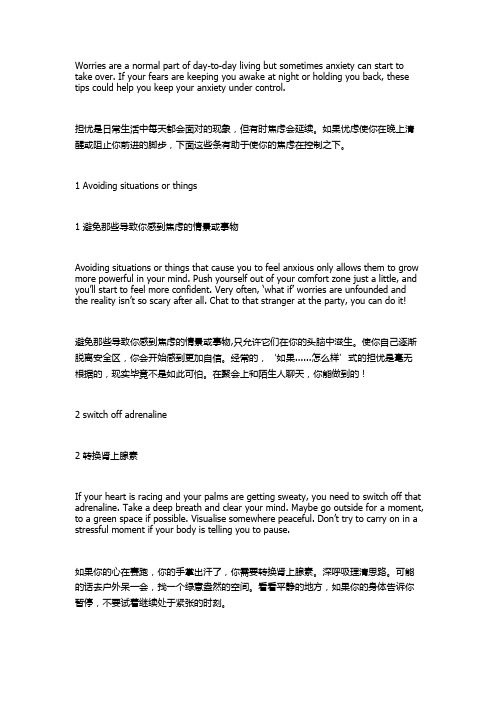
Worries are a normal part of day-to-day living but sometimes anxiety can start to take over. If your fears are keeping you awake at night or holding you back, these tips could help you keep your anxiety under control.担忧是日常生活中每天都会面对的现象,但有时焦虑会延续。
如果忧虑使你在晚上清醒或阻止你前进的脚步,下面这些条有助于使你的焦虑在控制之下。
1 Avoiding situations or things1 避免那些导致你感到焦虑的情景或事物Avoiding situations or things that cause you to feel anxious only allows them to grow more powerful in your mind. Push yourself out of your comfort zone just a little, and you’ll start to feel more confident. Very often, ‘what if’ worries are unfounded and the reality isn’t so scary after all. Chat to that stranger at the party, you can do it!避免那些导致你感到焦虑的情景或事物,只允许它们在你的头脑中滋生。
使你自己逐渐脱离安全区,你会开始感到更加自信。
经常的,‘如果......怎么样’式的担忧是毫无根据的,现实毕竟不是如此可怕。
在聚会上和陌生人聊天,你能做到的!2 switch off adrenaline2 转换肾上腺素If your heart is racing and your palms are getting sweaty, you need to switch off that adrenaline. Take a deep breath and clear your mind. Maybe go outside for a moment, to a green space if possible. Visualise somewhere peaceful. Don’t try to carry on in a stressful moment if your body is telling you to pause.如果你的心在赛跑,你的手掌出汗了,你需要转换肾上腺素。
怎样控制焦虑的英文作文

怎样控制焦虑的英文作文Feeling anxious? Take a deep breath. Inhale. Exhale. Repeat. Focus on your breath, feel it fill your lungs and then release. Let go of the tension in your body as you breathe out. Keep breathing, slowly and deeply.Distract yourself. Watch a funny movie, listen to your favorite music, or go for a walk outside. Engage inactivities that bring you joy and take your mind off the things that are causing you anxiety. Find something thatcan help you relax and unwind.Talk to someone. Share your feelings with a friend, family member, or therapist. Sometimes just talking about what's on your mind can help alleviate some of the anxiety you're feeling. Don't keep your emotions bottled up inside, let them out and seek support from those who care about you.Practice mindfulness. Stay present in the moment and focus on what you can control. Don't let your mind wanderto the future or dwell on the past. Be mindful of your thoughts and feelings without judgment. Accept them for what they are and let them pass.Take care of yourself. Eat well, exercise regularly, and get enough sleep. A healthy lifestyle can help reduce anxiety and improve your overall well-being. Treat yourself with kindness and compassion, and remember to prioritize self-care.Challenge negative thoughts. When you start to feel anxious, question the validity of your thoughts. Are they based on facts or assumptions? Challenge irrational beliefs and replace them with more rational and positive ones. Reframe your perspective and focus on the things that bring you peace and happiness.Seek professional help if needed. If your anxiety is overwhelming and affecting your daily life, don't hesitate to reach out to a mental health professional. Therapy, medication, or other forms of treatment can be beneficialin managing anxiety and improving your mental health. Remember, it's okay to ask for help when you need it.。
怎样应对焦虑困扰英语作文
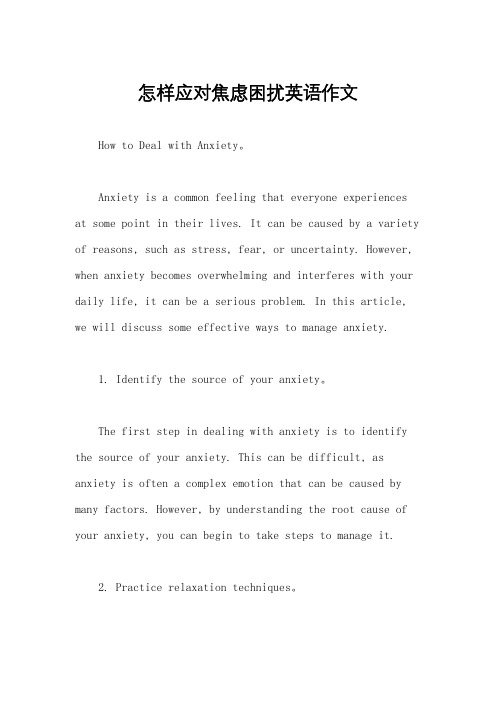
怎样应对焦虑困扰英语作文How to Deal with Anxiety。
Anxiety is a common feeling that everyone experiences at some point in their lives. It can be caused by a variety of reasons, such as stress, fear, or uncertainty. However, when anxiety becomes overwhelming and interferes with your daily life, it can be a serious problem. In this article, we will discuss some effective ways to manage anxiety.1. Identify the source of your anxiety。
The first step in dealing with anxiety is to identify the source of your anxiety. This can be difficult, as anxiety is often a complex emotion that can be caused by many factors. However, by understanding the root cause of your anxiety, you can begin to take steps to manage it.2. Practice relaxation techniques。
Relaxation techniques can be helpful in reducing anxiety. Deep breathing exercises, progressive muscle relaxation, and meditation are all effective ways to calm your mind and body. These techniques can be practiced anywhere, at any time, and can help you feel more relaxed and centered.3. Exercise regularly。
英语作文应对焦虑
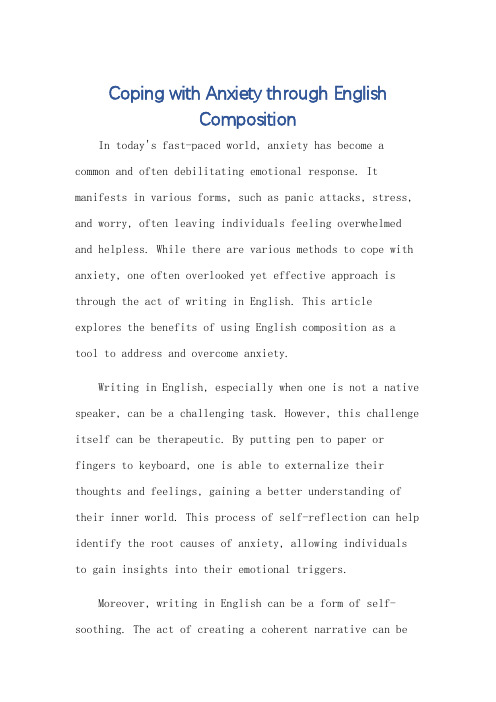
Coping with Anxiety through EnglishCompositionIn today's fast-paced world, anxiety has become a common and often debilitating emotional response. It manifests in various forms, such as panic attacks, stress, and worry, often leaving individuals feeling overwhelmed and helpless. While there are various methods to cope with anxiety, one often overlooked yet effective approach is through the act of writing in English. This article explores the benefits of using English composition as atool to address and overcome anxiety.Writing in English, especially when one is not a native speaker, can be a challenging task. However, this challenge itself can be therapeutic. By putting pen to paper or fingers to keyboard, one is able to externalize their thoughts and feelings, gaining a better understanding of their inner world. This process of self-reflection can help identify the root causes of anxiety, allowing individuals to gain insights into their emotional triggers.Moreover, writing in English can be a form of self-soothing. The act of creating a coherent narrative can becalming, as it helps organize scattered thoughts and brings a sense of closure to emotional experiences. This closure can provide a sense of relief, reducing the intensity of anxiety.Additionally, writing in English can serve as a form of communication. Sharing one's thoughts and feelings through writing can be a powerful way to connect with others. This connection can lead to a sense of support and understanding, which can be extremely helpful in reducing the isolationand loneliness that often accompany anxiety.Finally, writing in English can help build confidence. As one improves their writing skills, they also improvetheir ability to express themselves effectively. This enhanced communication ability can lead to a sense of accomplishment and empowerment, which can help boost one's self-esteem and reduce feelings of helplessness.In conclusion, while writing in English may initially seem like a daunting task for those who are not native speakers, it can actually be a powerful tool in coping with anxiety. Through self-reflection, self-soothing, communication, and confidence building, writing in Englishcan help individuals gain control over their emotional lives and overcome the grip of anxiety.**用英语写作应对焦虑**在当今快节奏的社会中,焦虑已成为一种常见的、往往使人衰弱的情绪反应。
解决焦虑的10种方式(双语阅读)

Worries are a normal part of day-to-day living but sometimes anxiety can start to take over. If your fears are keeping you awake at night or holding you back, these tips could help you keep your anxiety under control.担忧是日常生活中每天都会面对的现象,但有时焦虑会延续。
如果忧虑使你在晚上清醒或阻止你前进的脚步,下面这些条有助于使你的焦虑在控制之下。
1 Avoiding situations or things1 避免那些导致你感到焦虑的情景或事物Avoiding situations or things that cause you to feel anxious only allows them to grow more powerful in your mind. Push yourself out of your comfort zone just a little, and you’ll start to feel more confident. Very often, ‘what if’ worries are unfounded and the reality isn’t so scary after all. Chat to that stranger at the party, you can do it!避免那些导致你感到焦虑的情景或事物,只允许它们在你的头脑中滋生。
使你自己逐渐脱离安全区,你会开始感到更加自信。
经常的,‘如果......怎么样’式的担忧是毫无根据的,现实毕竟不是如此可怕。
在聚会上和陌生人聊天,你能做到的!2 switch off adrenaline2 转换肾上腺素If your heart is racing and your palms are getting sweaty, you need to switch off that adrenaline. Take a deep breath and clear your mind. Maybe go outside for a moment, to a green space if possible. Visualise somewhere peaceful. Don’t try to carry on in a stressful moment if your body is telling you to pause.如果你的心在赛跑,你的手掌出汗了,你需要转换肾上腺素。
神经学家教你如何缓解焦虑 中英互译
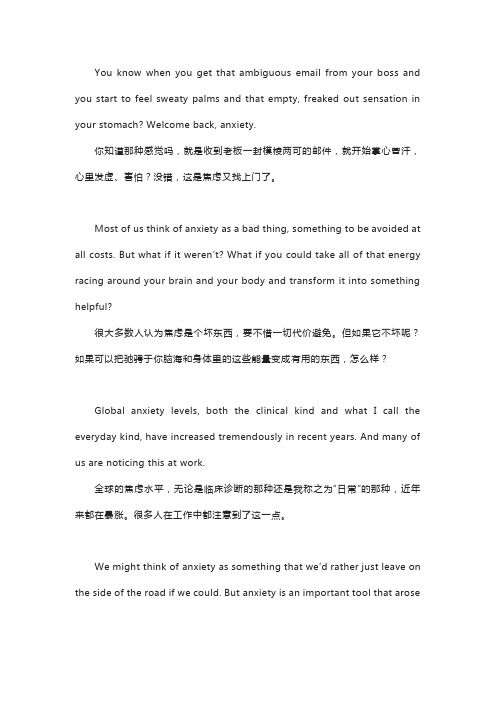
You know when you get that ambiguous email from your boss and you start to feel sweaty palms and that empty, freaked out sensation in your stomach? Welcome back, anxiety.你知道那种感觉吗,就是收到老板一封模棱两可的邮件,就开始掌心冒汗,心里发虚、害怕?没错,这是焦虑又找上门了。
Most of us think of anxiety as a bad thing, something to be avoided at all costs. But what if it weren’t? What if you could take all of that energy racing around your brain and your body and transform it into something helpful?很大多数人认为焦虑是个坏东西,要不惜一切代价避免。
但如果它不坏呢?如果可以把驰骋于你脑海和身体里的这些能量变成有用的东西,怎么样?Global anxiety levels, both the clinical kind and what I call the everyday kind, have increased tremendously in recent years. And many of us are noticing this at work.全球的焦虑水平,无论是临床诊断的那种还是我称之为“日常”的那种,近年来都在暴涨。
很多人在工作中都注意到了这一点。
We might think of anxiety as something that we’d rather just leave on the side of the road if we could. But anxiety is an important tool that aroseduring our evolution that we use to avoid danger. It’s essential for our survival.我们可能会把焦虑看作只要可以就弃如敝履的东西。
克服焦虑的英语名言
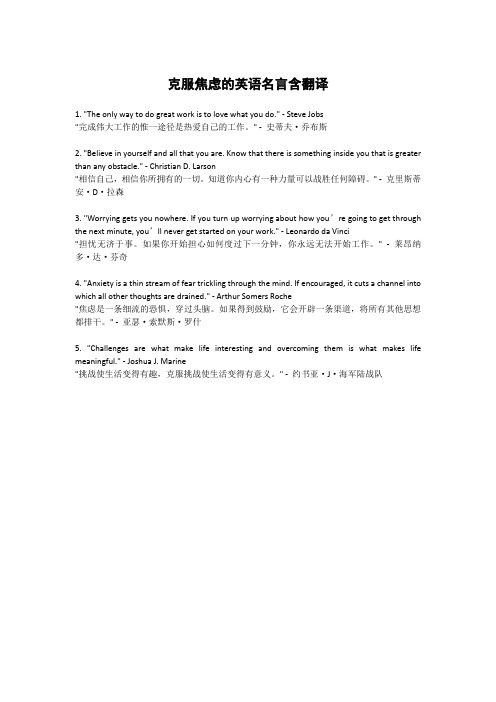
克服焦虑的英语名言含翻译1. "The only way to do great work is to love what you do." - Steve Jobs"完成伟大工作的惟一途径是热爱自己的工作。
" -史蒂夫·乔布斯2. "Believe in yourself and all that you are. Know that there is something inside you that is greater than any obstacle." - Christian D. Larson"相信自己,相信你所拥有的一切。
知道你内心有一种力量可以战胜任何障碍。
" -克里斯蒂安·D·拉森3. "Worrying gets you nowhere. If you turn up worrying about how you’re going to get through the next minute, you’ll never get started on your work." - Leonardo da Vinci"担忧无济于事。
如果你开始担心如何度过下一分钟,你永远无法开始工作。
" -莱昂纳多·达·芬奇4. "Anxiety is a thin stream of fear trickling through the mind. If encouraged, it cuts a channel into which all other thoughts are drained." - Arthur Somers Roche"焦虑是一条细流的恐惧,穿过头脑。
如果得到鼓励,它会开辟一条渠道,将所有其他思想都排干。
应对社会焦虑的建议的英语作文
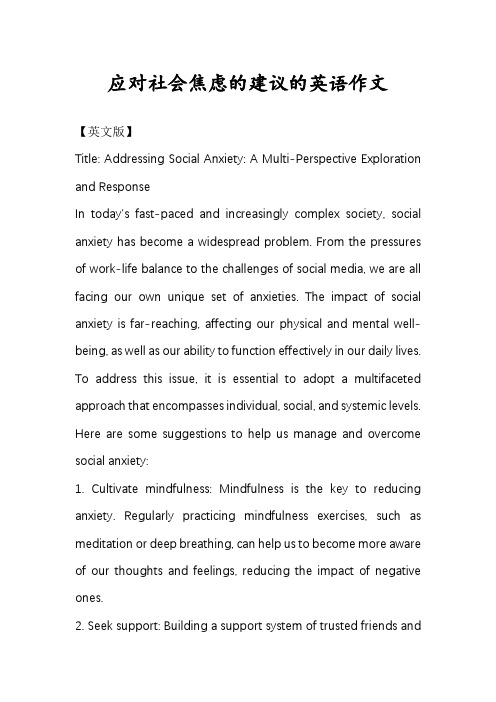
应对社会焦虑的建议的英语作文【英文版】Title: Addressing Social Anxiety: A Multi-Perspective Exploration and ResponseIn today's fast-paced and increasingly complex society, social anxiety has become a widespread problem. From the pressures of work-life balance to the challenges of social media, we are all facing our own unique set of anxieties. The impact of social anxiety is far-reaching, affecting our physical and mental well-being, as well as our ability to function effectively in our daily lives. To address this issue, it is essential to adopt a multifaceted approach that encompasses individual, social, and systemic levels. Here are some suggestions to help us manage and overcome social anxiety:1. Cultivate mindfulness: Mindfulness is the key to reducing anxiety. Regularly practicing mindfulness exercises, such as meditation or deep breathing, can help us to become more aware of our thoughts and feelings, reducing the impact of negative ones.2. Seek support: Building a support system of trusted friends andfamily members is crucial. Share your feelings and concerns with those who will listen, and lean on them for support and encouragement.3. Practice self-compassion: Be kind to yourself, even when faced with challenges and setbacks. Self-compassion means treating yourself with understanding, empathy, and acceptance, rather than judgment or criticism.4. Take breaks from technology: Social media and other digital platforms can be a source of constant comparison and anxiety. Take breaks from these platforms to recharge your batteries and refocus on what truly matters to you.5. Seek professional help: If you feel that your anxiety is affecting your daily functioning or your mental health in general, seek the help of a mental health professional. They can provide you with valuable support and guidance in managing your anxiety effectively.On a broader level, we need to create a more inclusive society that values diversity and encourages social connectedness. We must work to eliminate bias and discrimination, promoting understanding and respect for all members of society. Only then can we truly address the root causes of social anxiety and createa more peaceful and harmonious society for all.【中文版】应对社会焦虑的建议:多角度的探索与应对在快节奏且日益复杂的社会中,社会焦虑已成为一个普遍问题。
如何去应对焦虑英语作文
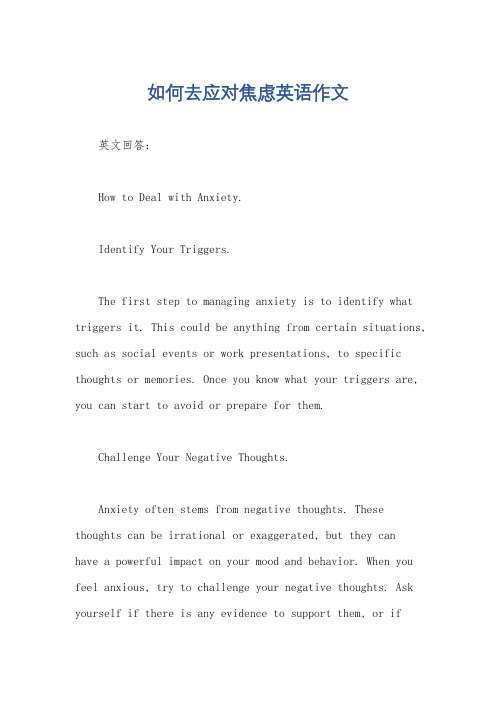
如何去应对焦虑英语作文英文回答:How to Deal with Anxiety.Identify Your Triggers.The first step to managing anxiety is to identify what triggers it. This could be anything from certain situations, such as social events or work presentations, to specific thoughts or memories. Once you know what your triggers are, you can start to avoid or prepare for them.Challenge Your Negative Thoughts.Anxiety often stems from negative thoughts. These thoughts can be irrational or exaggerated, but they canhave a powerful impact on your mood and behavior. When you feel anxious, try to challenge your negative thoughts. Ask yourself if there is any evidence to support them, or ifyou are simply catastrophizing.Relaxation Techniques.There are a number of relaxation techniques that can help to reduce anxiety. These include deep breathing, meditation, yoga, and progressive muscle relaxation. Practicing these techniques regularly can help to calm your mind and body.Exercise.Exercise is another great way to reduce anxiety. When you exercise, your body releases endorphins, which have mood-boosting effects. Exercise can also help to improve your sleep, which is important for managing anxiety.Avoid Caffeine and Alcohol.Caffeine and alcohol can both worsen anxiety. Caffeine can make you feel jittery and on edge, while alcohol can depress your nervous system and lead to rebound anxiety. Ifyou are struggling with anxiety, it is best to avoid these substances.Get Enough Sleep.Getting enough sleep is essential for managing anxiety. When you are sleep-deprived, you are more likely to feel irritable, anxious, and stressed. Aim for 7-8 hours of sleep each night.Talk to Someone.If you are struggling to manage your anxiety on your own, it is important to talk to someone. This could be a therapist, counselor, or trusted friend or family member. Talking about your anxiety can help you to process your feelings and develop coping mechanisms.Medication.In some cases, medication may be necessary to manage anxiety. There are a number of different medications thatcan be used to treat anxiety, and your doctor can help you find the one that is right for you.中文回答:应对焦虑的方法。
如何应对焦虑情绪 英语作文
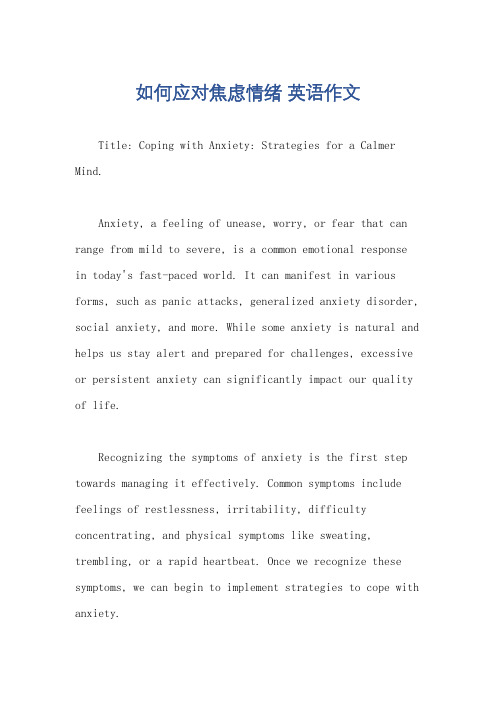
如何应对焦虑情绪英语作文Title: Coping with Anxiety: Strategies for a Calmer Mind.Anxiety, a feeling of unease, worry, or fear that can range from mild to severe, is a common emotional responsein today's fast-paced world. It can manifest in various forms, such as panic attacks, generalized anxiety disorder, social anxiety, and more. While some anxiety is natural and helps us stay alert and prepared for challenges, excessive or persistent anxiety can significantly impact our quality of life.Recognizing the symptoms of anxiety is the first step towards managing it effectively. Common symptoms include feelings of restlessness, irritability, difficulty concentrating, and physical symptoms like sweating, trembling, or a rapid heartbeat. Once we recognize these symptoms, we can begin to implement strategies to cope with anxiety.One of the most effective ways to cope with anxiety is through breathing exercises. Deep breathing helps to slow down the heart rate and relax the body, counteracting the physical symptoms of anxiety. By focusing on our breathing, we can bring ourselves back to a state of calmness and groundedness.Mindfulness is another powerful tool in managing anxiety. By being present in the moment and observing our thoughts and feelings without judgment, we can gain abetter understanding of what is causing our anxiety. Mindfulness also helps us to identify and avoid negative thought patterns that can exacerbate anxiety.Exercise is another excellent way to cope with anxiety. Physical activity releases endorphins, which are mood-boosting chemicals in the brain. Regular exercise not only improves physical health but also has a positive impact on mental well-being. Even simple activities like walking or yoga can help to reduce anxiety levels.Sleep is crucial for maintaining mental health, and anxiety can often interfere with sleep. Establishing a regular sleep schedule, avoiding screens before bedtime, and practicing relaxation techniques before sleep can help improve sleep quality and reduce anxiety.Talking to a trusted friend or family member can also provide relief from anxiety. Sharing our feelings can help us to gain perspective and receive support from someone who cares about us. In some cases, seeking professional help from a therapist or counselor may be necessary to address deeper-seated anxiety issues.Practicing relaxation techniques such as progressive muscle relaxation, visualization, or meditation can also be beneficial in managing anxiety. These techniques help us to focus on positive images and feelings, distracting us from negative thoughts and worries.Maintaining a healthy lifestyle is also essential in managing anxiety. Eating a balanced diet, getting enough sleep, and limiting caffeine and alcohol intake can help toreduce anxiety levels. Additionally, avoiding stressful situations or learning to manage them effectively can help prevent anxiety from spiraling out of control.In conclusion, anxiety is a common emotional response that can be managed effectively with the right strategies. By implementing a combination of breathing exercises, mindfulness, exercise, sleep hygiene, social support, relaxation techniques, and maintaining a healthy lifestyle, we can reduce anxiety levels and enjoy a calmer, more balanced life. Remember, it is okay to feel anxious, and it is important to be kind and patient with ourselves as we learn to cope with this emotion.。
应对焦虑英语作文
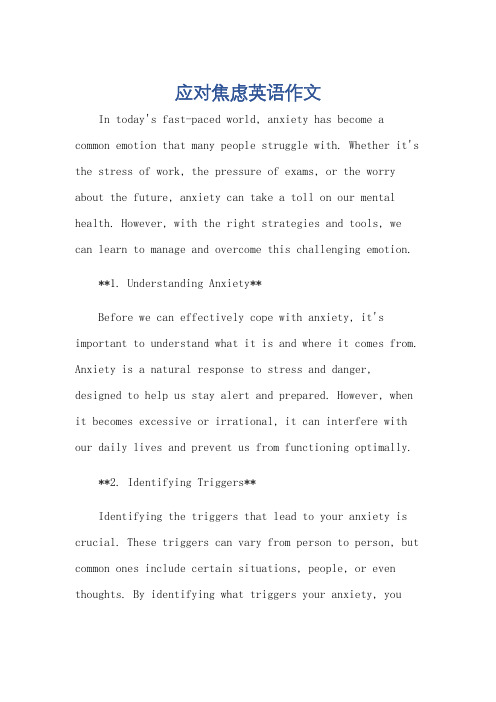
应对焦虑英语作文In today's fast-paced world, anxiety has become a common emotion that many people struggle with. Whether it's the stress of work, the pressure of exams, or the worry about the future, anxiety can take a toll on our mental health. However, with the right strategies and tools, we can learn to manage and overcome this challenging emotion. **1. Understanding Anxiety**Before we can effectively cope with anxiety, it's important to understand what it is and where it comes from. Anxiety is a natural response to stress and danger, designed to help us stay alert and prepared. However, when it becomes excessive or irrational, it can interfere with our daily lives and prevent us from functioning optimally. **2. Identifying Triggers**Identifying the triggers that lead to your anxiety is crucial. These triggers can vary from person to person, but common ones include certain situations, people, or even thoughts. By identifying what triggers your anxiety, youcan take steps to avoid or manage these triggers more effectively.**3. Breathing Techniques**Breathing techniques are a simple yet effective way to manage anxiety. Deep breathing helps to slow down your heart rate, reduce stress hormones, and bring your body back to a state of calm. Try taking slow, deep breaths through your nose and exhaling slowly through your mouth when you feel anxious.**4. Mindfulness**Mindfulness is the practice of being present in the moment and aware of your thoughts and feelings. By focusing on the present rather than worrying about the future, you can reduce the intensity of your anxiety. Try engaging in mindfulness activities like meditation, yoga, or simply taking a walk in nature when you feel anxious.**5. Talking It Out**Sharing your anxieties with a trusted friend or family member can be very helpful. Talking about your feelings can help you gain perspective, receive support, and feel lessalone in your struggle. If you feel like you need more support, consider seeking professional help from atherapist or counselor.**6. Creating a Self-Care Routine**Prioritizing self-care is essential for managing anxiety. Make sure to get enough sleep, eat a balanced diet, exercise regularly, and engage in activities that bring you joy. These healthy habits can help reduce stress andimprove your overall mood.**7. Learning to Let Go**Finally, learning to let go of worries and accept uncertainty can be a powerful tool in managing anxiety. While it's impossible to control everything in life, youcan control your response to it. Try to adopt a morepositive and adaptive mindset when faced with uncertaintyor challenges.In conclusion, anxiety is a common and manageable emotion. By understanding your triggers, practicing breathing techniques, engaging in mindfulness, sharing your feelings, prioritizing self-care, and learning to let go,you can effectively cope with anxiety and improve your emotional well-being. Remember, you are not alone in this struggle, and there are resources and support available to help you along the way.**应对焦虑:情绪健康的指南**在当今快节奏的社会中,焦虑已成为许多人面临的常见情绪。
如何应对焦虑情绪 英语作文
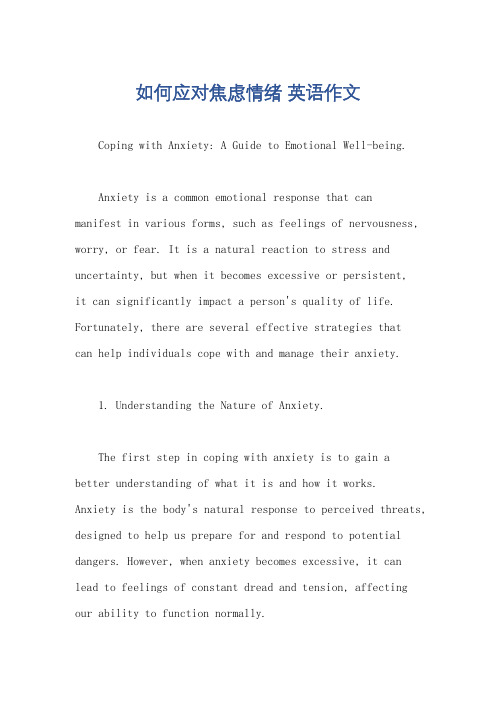
如何应对焦虑情绪英语作文Coping with Anxiety: A Guide to Emotional Well-being.Anxiety is a common emotional response that canmanifest in various forms, such as feelings of nervousness, worry, or fear. It is a natural reaction to stress and uncertainty, but when it becomes excessive or persistent,it can significantly impact a person's quality of life. Fortunately, there are several effective strategies thatcan help individuals cope with and manage their anxiety.1. Understanding the Nature of Anxiety.The first step in coping with anxiety is to gain abetter understanding of what it is and how it works.Anxiety is the body's natural response to perceived threats, designed to help us prepare for and respond to potential dangers. However, when anxiety becomes excessive, it can lead to feelings of constant dread and tension, affecting our ability to function normally.2. Identifying Triggers.Identifying the specific triggers that lead to anxious feelings is crucial. Keeping a journal or diary can help in tracking patterns and identifying common triggers, such as certain situations, people, or activities. Once identified, it becomes easier to avoid or prepare for these triggers.3. Breathing Techniques.Deep breathing is an effective tool for managing anxiety in the moment. Slow, deep breaths help to activate the parasympathetic nervous system, which is responsiblefor the body's relaxation response. By focusing on your breathing, you can interrupt the cycle of anxious thoughts and begin to calm your nervous system.4. Mindfulness.Mindfulness is the practice of being present and aware in the moment, rather than dwelling on worries or fearsabout the future. By focusing on your current experience, you can interrupt the cycle of anxious thoughts and begin to feel more grounded and relaxed. Mindfulness practices such as meditation, yoga, or simply taking a moment to appreciate your surroundings can be helpful.5. Physical Activity.Regular physical activity can significantly reduce anxiety levels. Exercise releases endorphins, the body's natural "feel-good" chemicals, which help to improve mood and reduce stress. Even simple activities like walking, jogging, or cycling can make a difference.6. Sleep Hygiene.Getting enough sleep is crucial for maintaining emotional well-being. Sleep deprivation can lead to increased anxiety levels, so it's important to establish healthy sleep habits. This includes going to bed and waking up at consistent times, avoiding screens before bedtime, and creating a relaxing sleep environment.7. Healthy Eating.Maintaining a healthy diet can help to regulate mood and reduce anxiety. Eating plenty of fruits, vegetables, whole grains, and lean protein can provide the body with the nutrients it needs to function optimally. Avoiding processed foods and sugary snacks, which can lead to energy crashes and mood swings, is also important.8. Social Support.Having a supportive social network is essential for coping with anxiety. Talking to friends, family, or a therapist about your feelings can help to alleviate the burden and provide valuable perspectives. Support groups or online communities can also be a great resource for finding understanding and support.9. Relaxation Techniques.Relaxation techniques such as progressive musclerelaxation or guided imagery can help to reduce physical symptoms of anxiety, like tension or racing thoughts. These techniques involve focusing on specific muscle groups and relaxing them one by one, or visualizing calming scenes to induce a state of relaxation.10. Cognitive Restructuring.Cognitive restructuring involves challenging and reframing negative thoughts and beliefs that contribute to anxiety. By identifying and disputing these thoughts, you can begin to shift your perspective and gain a more balanced, realistic view of the situation.In conclusion, anxiety is a common and manageable emotional response. By understanding its nature,identifying triggers, and implementing effective coping strategies, individuals can begin to reduce their anxiety levels and improve their overall quality of life. Remember, it's okay to feel anxious, and it's important to give yourself the space and time to process these feelings. Withpatience and practice, you can learn to manage your anxiety and move forward with greater peace and clarity.。
英语作文应对焦虑
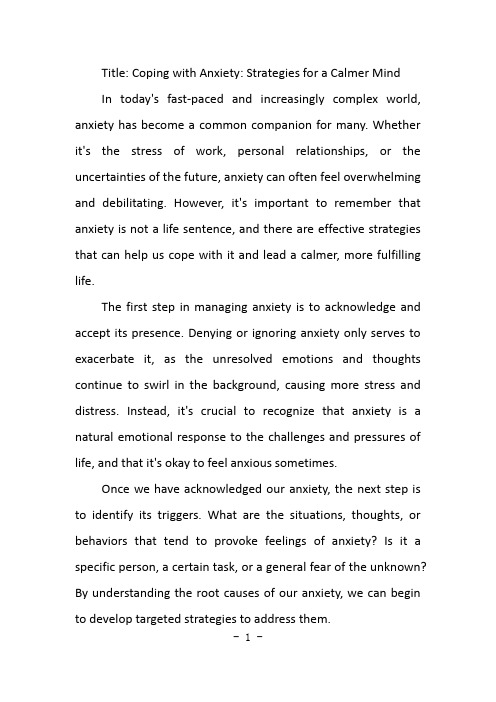
Title: Coping with Anxiety: Strategies for a Calmer MindIn today's fast-paced and increasingly complex world, anxiety has become a common companion for many. Whether it's the stress of work, personal relationships, or the uncertainties of the future, anxiety can often feel overwhelming and debilitating. However, it's important to remember that anxiety is not a life sentence, and there are effective strategies that can help us cope with it and lead a calmer, more fulfilling life.The first step in managing anxiety is to acknowledge and accept its presence. Denying or ignoring anxiety only serves to exacerbate it, as the unresolved emotions and thoughts continue to swirl in the background, causing more stress and distress. Instead, it's crucial to recognize that anxiety is a natural emotional response to the challenges and pressures of life, and that it's okay to feel anxious sometimes.Once we have acknowledged our anxiety, the next step is to identify its triggers. What are the situations, thoughts, or behaviors that tend to provoke feelings of anxiety? Is it a specific person, a certain task, or a general fear of the unknown? By understanding the root causes of our anxiety, we can begin to develop targeted strategies to address them.One effective strategy for managing anxiety is to practice relaxation techniques. Deep breathing, meditation, and yoga are all excellent ways to calm the mind and body. By focusing on the present moment and slowing down our breathing, we can interrupt the cycle of anxious thoughts and bring ourselves back to a state of peace and tranquility. Regular practice of these relaxation techniques can help us to develop a sense of inner calm that persists even during stressful situations.In addition to relaxation techniques, it's also important to incorporate healthy lifestyle habits into our daily routine. A balanced diet, regular exercise, and sufficient sleep are essential for maintaining a stable mood and reducing anxiety levels. Eating a variety of fruits, vegetables, and whole grains can provide the body with the nutrients it needs to function properly, while exercise releases endorphins, the "happy hormones" that help to boost our mood and reduce stress. Getting enough sleep is also crucial for maintaining emotional well-being, as sleep deprivation can exacerbate feelings of anxiety and irritability.Moreover, seeking support from others can be invaluable in managing anxiety. Whether it's talking to a trusted friend, family member, or mental health professional, sharing ourfeelings and experiences can help us to gain perspective, receive valuable advice, and feel less alone in our struggle. It's important to remember that we are not alone in our feelings of anxiety, and that there are people who are willing and able to offer support and understanding.Finally, it's essential to maintain a positive mindset and focus on the things that bring us joy and fulfillment. While it's natural to have negative thoughts and feelings sometimes, it's important not to let them define us or overshadow our lives. Instead, we should strive to cultivate a mindset of gratitude and appreciation for the good things in our lives, and actively engage in activities that bring us happiness and satisfaction. This could include hobbies, creative pursuits, spending time with loved ones, or simply taking time to appreciate the beauty of nature.In conclusion, anxiety is a common but manageable challenge that we all face at some point in our lives. By acknowledging its presence, identifying its triggers, practicing relaxation techniques, maintaining healthy lifestyle habits, seeking support, and maintaining a positive mindset, we can learn to cope with anxiety and lead a calmer, more fulfilling life. Remember, it's okay to feel anxious sometimes, but it's neverokay to let anxiety control your life. With the right strategies and support, we can overcome our fears and anxieties and embrace a happier, more peaceful existence.。
英语作文怎样克服焦虑心理
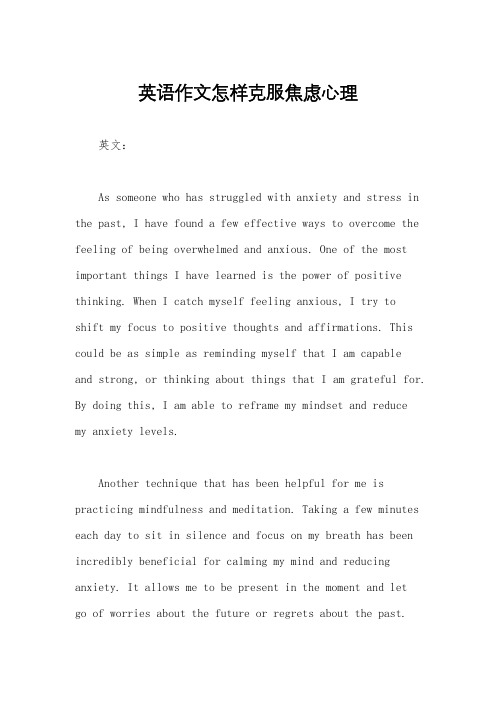
英语作文怎样克服焦虑心理英文:As someone who has struggled with anxiety and stress in the past, I have found a few effective ways to overcome the feeling of being overwhelmed and anxious. One of the most important things I have learned is the power of positive thinking. When I catch myself feeling anxious, I try toshift my focus to positive thoughts and affirmations. This could be as simple as reminding myself that I am capableand strong, or thinking about things that I am grateful for. By doing this, I am able to reframe my mindset and reducemy anxiety levels.Another technique that has been helpful for me is practicing mindfulness and meditation. Taking a few minutes each day to sit in silence and focus on my breath has been incredibly beneficial for calming my mind and reducing anxiety. It allows me to be present in the moment and letgo of worries about the future or regrets about the past.Additionally, I have found that regular exercise, such as yoga or going for a run, helps to release built-up tension and stress in my body, which in turn helps to alleviate my anxiety.In addition to these techniques, I have also found it helpful to talk to someone I trust about my feelings. Whether it's a friend, family member, or therapist, having someone to confide in can provide a sense of relief and support. Sometimes, just vocalizing my worries and fears can make them feel less overwhelming.It's important to note that everyone is different, and what works for one person may not work for another. It's all about finding what techniques and coping mechanisms work best for you as an individual. By being patient and persistent, I have been able to overcome my anxiety and live a more balanced and fulfilling life.中文:作为一个曾经也曾经感到焦虑和压力的人,我发现了一些有效的方法来克服这种不安和焦虑的感觉。
拒绝焦虑走心文案英语
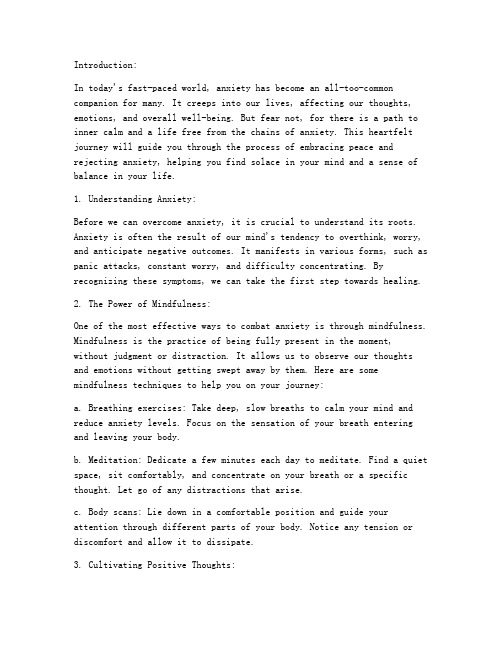
Introduction:In today's fast-paced world, anxiety has become an all-too-common companion for many. It creeps into our lives, affecting our thoughts, emotions, and overall well-being. But fear not, for there is a path to inner calm and a life free from the chains of anxiety. This heartfelt journey will guide you through the process of embracing peace and rejecting anxiety, helping you find solace in your mind and a sense of balance in your life.1. Understanding Anxiety:Before we can overcome anxiety, it is crucial to understand its roots. Anxiety is often the result of our mind's tendency to overthink, worry, and anticipate negative outcomes. It manifests in various forms, such as panic attacks, constant worry, and difficulty concentrating. By recognizing these symptoms, we can take the first step towards healing.2. The Power of Mindfulness:One of the most effective ways to combat anxiety is through mindfulness. Mindfulness is the practice of being fully present in the moment, without judgment or distraction. It allows us to observe our thoughts and emotions without getting swept away by them. Here are some mindfulness techniques to help you on your journey:a. Breathing exercises: Take deep, slow breaths to calm your mind and reduce anxiety levels. Focus on the sensation of your breath entering and leaving your body.b. Meditation: Dedicate a few minutes each day to meditate. Find a quiet space, sit comfortably, and concentrate on your breath or a specific thought. Let go of any distractions that arise.c. Body scans: Lie down in a comfortable position and guide your attention through different parts of your body. Notice any tension or discomfort and allow it to dissipate.3. Cultivating Positive Thoughts:Negative thoughts can fuel anxiety and create a cycle of worry. To break this cycle, it is essential to cultivate positive thoughts. Here are some strategies:a. Affirmations: Repeat positive affirmations to reinforce a positive mindset. For example, "I am capable of handling any challenge that comes my way."b. Gratitude journaling: Each day, write down things you are grateful for. This practice helps shift your focus from what you lack to the abundance in your life.c. Positive self-talk: Replace negative self-talk with positive affirmations. Instead of thinking, "I can't do this," say, "I am doing my best, and that is enough."4. Establishing a Routine:Creating a structured routine can provide a sense of control and stability, which is often lacking in anxious individuals. Here are some tips for establishing a routine:a. Set a consistent sleep schedule: Aim for 7-9 hours of quality sleep each night. Establishing a bedtime routine can help signal to your body that it's time to wind down.b. Schedule breaks: Allocate time for breaks throughout your day to recharge and prevent burnout. Use this time to engage in activities that bring you joy and relaxation.c. Prioritize self-care: Make time for activities that nurture your physical, emotional, and spiritual well-being. This may include exercise, hobbies, and spending time with loved ones.5. Seeking Support:It is essential to acknowledge that overcoming anxiety is not a solo journey. Seek support from friends, family, or a mental health professional. Sharing your struggles can provide comfort and guidance, and you may find that others have experienced similar challenges.Conclusion:The path to inner calm and a life free from anxiety is a journey that requires patience, dedication, and self-compassion. By understanding anxiety, practicing mindfulness, cultivating positive thoughts, establishing a routine, and seeking support, you can navigate this path with confidence. Embrace peace, reject anxiety, and embark on a transformative journey to a happier, more fulfilling life.。
缓解焦虑的英语对话
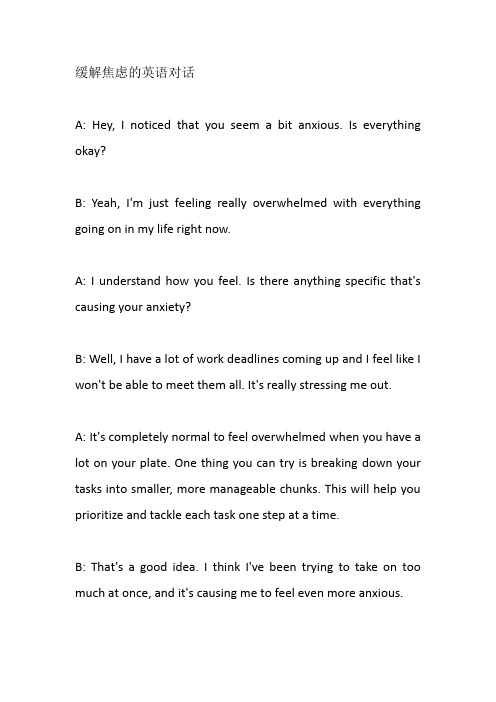
缓解焦虑的英语对话A: Hey, I noticed that you seem a bit anxious. Is everything okay?B: Yeah, I'm just feeling really overwhelmed with everything going on in my life right now.A: I understand how you feel. Is there anything specific that's causing your anxiety?B: Well, I have a lot of work deadlines coming up and I feel like I won't be able to meet them all. It's really stressing me out.A: It's completely normal to feel overwhelmed when you have a lot on your plate. One thing you can try is breaking down your tasks into smaller, more manageable chunks. This will help you prioritize and tackle each task one step at a time.B: That's a good idea. I think I've been trying to take on too much at once, and it's causing me to feel even more anxious.A: Remember, it's okay to ask for help or delegate some tasks if you feel overloaded. You don't have to do everything on your own.B: You're right. I tend to forget that asking for help is an option. I'll try reaching out to my colleagues and see if they can assist me with some of the work.A: That's a great plan. Additionally, taking breaks and engaging in activities that relax you can also help alleviate anxiety. Whether it's going for a walk, practicing deep breathing exercises, or listening to calming music, finding ways to unwind can make a big difference.B: I'll definitely make time for self-care and relaxation. Sometimes, I forget to prioritize my own well-being in the midst of everything.A: It happens to all of us. Just remember that you're doing your best, and it's important to take care of yourself both mentally and physically.B: Thank you for understanding and offering such helpful advice.I already feel a bit better just talking about it.A: You're welcome! Remember, I'm here for you anytime you need to talk or if there's anything else I can do to support you.B: I really appreciate that. Having someone to talk to makes a big difference.A: 嗨,我注意到你似乎有点焦虑。
缓解焦虑英文作文
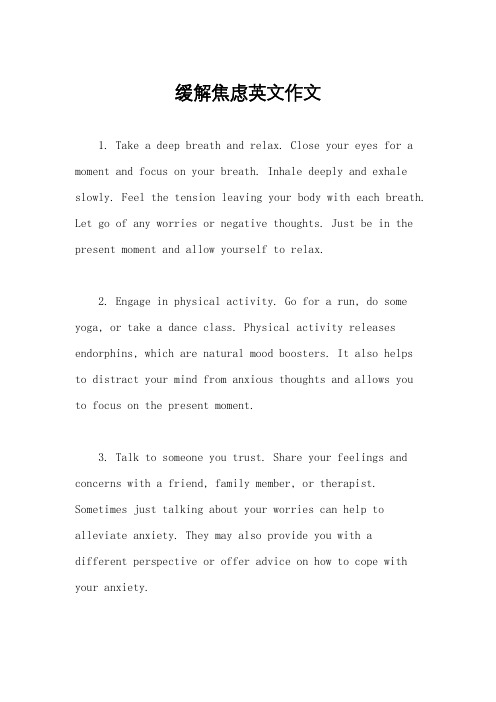
缓解焦虑英文作文1. Take a deep breath and relax. Close your eyes for a moment and focus on your breath. Inhale deeply and exhale slowly. Feel the tension leaving your body with each breath. Let go of any worries or negative thoughts. Just be in the present moment and allow yourself to relax.2. Engage in physical activity. Go for a run, do some yoga, or take a dance class. Physical activity releases endorphins, which are natural mood boosters. It also helpsto distract your mind from anxious thoughts and allows youto focus on the present moment.3. Talk to someone you trust. Share your feelings and concerns with a friend, family member, or therapist. Sometimes just talking about your worries can help to alleviate anxiety. They may also provide you with adifferent perspective or offer advice on how to cope with your anxiety.4. Practice mindfulness. Pay attention to the present moment without judgment. Notice the sights, sounds, and sensations around you. Engage in activities that fully absorb your attention, such as painting, gardening, or cooking. Mindfulness helps to shift your focus away from anxious thoughts and brings you back to the present.5. Take breaks from social media and news. Constant exposure to negative news and social media can contribute to anxiety. Take a break from these sources of information and focus on activities that bring you joy and relaxation. Limit your screen time and instead, engage in activities that promote self-care and well-being.6. Practice self-care. Take care of your physical and emotional needs. Get enough sleep, eat nutritious meals, and engage in activities that bring you joy and relaxation. Set aside time for self-care activities such as taking a bath, reading a book, or listening to music. Taking care of yourself will help to reduce anxiety and improve your overall well-being.7. Challenge negative thoughts. When you noticeyourself having negative or anxious thoughts, challenge them. Ask yourself if there is evidence to support these thoughts or if they are just assumptions. Replace negative thoughts with positive and realistic ones. Remind yourself of your strengths and accomplishments.8. Try relaxation techniques. Explore different relaxation techniques such as deep breathing exercises, progressive muscle relaxation, or guided imagery. These techniques can help to calm your mind and body, reducing anxiety.9. Find activities that bring you joy and relaxation. Engage in activities that you enjoy and that help you to relax. This could be anything from reading a book,listening to music, going for a walk in nature, or spending time with loved ones. Find what works for you and make time for these activities regularly.10. Seek professional help if needed. If your anxiety is interfering with your daily life and you are unable tomanage it on your own, consider seeking help from a mental health professional. They can provide you with the necessary tools and support to overcome your anxiety. Remember, you don't have to face it alone.。
如何应对焦虑英语作文120字
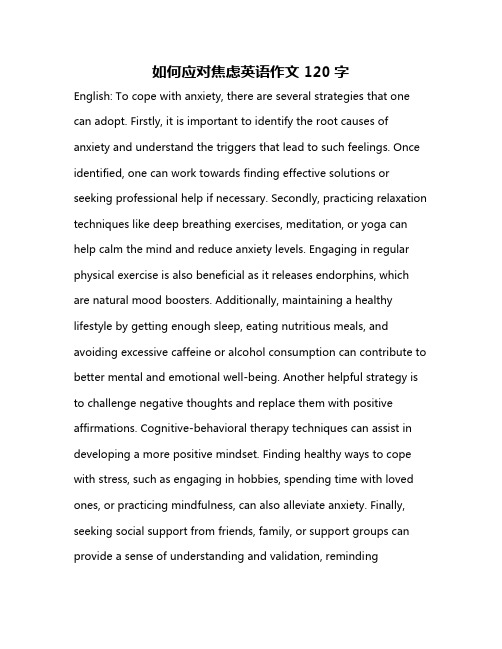
如何应对焦虑英语作文120字English: To cope with anxiety, there are several strategies that one can adopt. Firstly, it is important to identify the root causes of anxiety and understand the triggers that lead to such feelings. Once identified, one can work towards finding effective solutions or seeking professional help if necessary. Secondly, practicing relaxation techniques like deep breathing exercises, meditation, or yoga can help calm the mind and reduce anxiety levels. Engaging in regular physical exercise is also beneficial as it releases endorphins, which are natural mood boosters. Additionally, maintaining a healthy lifestyle by getting enough sleep, eating nutritious meals, and avoiding excessive caffeine or alcohol consumption can contribute to better mental and emotional well-being. Another helpful strategy is to challenge negative thoughts and replace them with positive affirmations. Cognitive-behavioral therapy techniques can assist in developing a more positive mindset. Finding healthy ways to cope with stress, such as engaging in hobbies, spending time with loved ones, or practicing mindfulness, can also alleviate anxiety. Finally, seeking social support from friends, family, or support groups can provide a sense of understanding and validation, remindingindividuals that they are not alone in their struggles. Translated content: 应对焦虑可采取几种策略。
应对焦虑英语作文
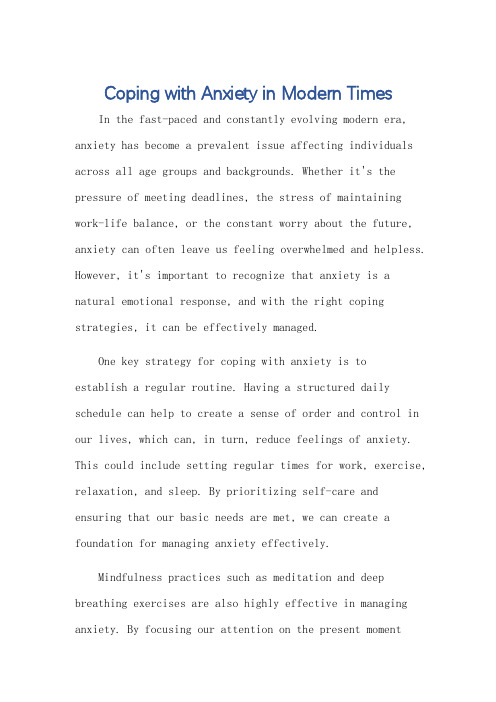
Coping with Anxiety in Modern TimesIn the fast-paced and constantly evolving modern era, anxiety has become a prevalent issue affecting individuals across all age groups and backgrounds. Whether it's the pressure of meeting deadlines, the stress of maintaining work-life balance, or the constant worry about the future, anxiety can often leave us feeling overwhelmed and helpless. However, it's important to recognize that anxiety is a natural emotional response, and with the right coping strategies, it can be effectively managed.One key strategy for coping with anxiety is toestablish a regular routine. Having a structured daily schedule can help to create a sense of order and control in our lives, which can, in turn, reduce feelings of anxiety. This could include setting regular times for work, exercise, relaxation, and sleep. By prioritizing self-care and ensuring that our basic needs are met, we can create a foundation for managing anxiety effectively.Mindfulness practices such as meditation and deep breathing exercises are also highly effective in managing anxiety. By focusing our attention on the present momentand tuning into our bodily sensations, we can become more aware of our anxiety triggers and learn to respond to them in a calm and rational manner. Regular practice of these techniques can help us to cultivate a sense of inner peace and resilience in the face of stress.In addition to these individual-level strategies, seeking support from others can also be beneficial. Talking to friends, family, or a mental health professional about our feelings and experiences can help us to gain adifferent perspective and feel less alone in our struggles. The support and understanding of others can provide us with a sense of validation and comfort, which can, in turn, reduce the intensity of our anxiety.Moreover, it's crucial to remember that anxiety is not a permanent condition, and it can be overcome with time and effort. By adopting a positive mindset and focusing on our strengths and abilities, we can build resilience and confidence in our ability to cope with anxiety. Additionally, challenging negative thoughts and replacing them with more realistic and positive ones can help us to reframe our perspective and reduce anxiety.In conclusion, managing anxiety in modern times requires a multi-faceted approach that combines individual strategies, mindfulness practices, and social support. By establishing a regular routine, practicing mindfulness, seeking support, and maintaining a positive mindset, we can effectively cope with anxiety and lead a more balanced and fulfilling life.**应对现代焦虑**在节奏快速、不断变化的现代时代,焦虑已成为影响各个年龄段和背景个体的普遍问题。
- 1、下载文档前请自行甄别文档内容的完整性,平台不提供额外的编辑、内容补充、找答案等附加服务。
- 2、"仅部分预览"的文档,不可在线预览部分如存在完整性等问题,可反馈申请退款(可完整预览的文档不适用该条件!)。
- 3、如文档侵犯您的权益,请联系客服反馈,我们会尽快为您处理(人工客服工作时间:9:00-18:30)。
如何应对焦虑焦虑可以说是生活中固有之物。
当我们每每面临威胁到我们的安康感的状况的时候,焦虑——我们心理活动的一种——会应运而生。
因为焦虑这种心理活动是深深植根于我们的大脑中的,我们没有办法阻止它不出现。
然而,如果我们有足够的意识和自我控制抵制它的侵蚀的话,我们就能采取相应的反应。
任由焦虑控制我们的思想会使我们变的紧张和沮丧。
其实我们没有意识到我们内心的很多恐惧都是毫无根据的。
我们大脑经常会有这种习惯:大脑中幻化出一副副可怕的景象。
任由其发展,这些可怕的景象就会幻化于我们的实际生活中,妨害我们对事实的判断。
如果我们真的试图想控制焦虑感的话,我们就必须停止我们头脑中的消极的想法。
取而代之是我们应该把我们的注意力专注在我们周围的清晰的事实上,并从中分析和判断我们真正的忧虑和担心何在。
这样我们就会减轻我们的焦虑程度。
当然,又回到这个问题:我们该怎样对付焦虑?说句实话,对付焦虑确实不是一件容易的事。
我们的基因组成就注定了阻止我们头脑中的这种对外界不适的自动反应是困难的。
但是,如果我们愿意、并不断练习,我们就能够改善我们处理焦虑的方法。
首先,我们必须弄清楚我们恐惧的实质是什么。
我们需要找出它们因何而来,我们为什么会有这种感觉。
没有这方面的理解,一旦焦虑充斥我们头脑的时候,我们就不能采取合适的方法对付它。
当我们理解了我们的焦虑的实质,我们就会对它看的更清楚。
这个重要的因素是改变恐惧对我们思想影响的关键。
一旦我们意识到我们焦虑的时候,我们就能够借助我们的理智干预。
然后我们就能够对我们焦虑的实质做出分析。
然而,有意识和理解是不够的。
愿意抛弃我们毫无根据的恐惧也是必需的。
如果我们没有意愿改变我们我们对焦虑的看法,我们就很难舒解我们的紧张感。
确证我们的焦虑之源需要时间、坚韧和执着。
每当焦虑产生在我们思想的时候,我们就必须通过我们的意识有意干预,然后确认我们焦虑的事情的实际是怎样。
一旦我们从各种假象中分辨出事实,我们就必须重新组织我们的思维,摈弃假象。
尽管刚开始这样做比较难,但熟能生巧。
就我本人而言,我往往经常陷滞于我的担忧无法自拔。
但就我现在所知很大一部分我的那些担忧都不过是我头脑中自我庸扰的幻想罢了。
所有的时间我把自己不停的围困在事实上并不存在的担忧之中。
花了很长时间我才渐渐意识到我已经浪费了多少时间和精力思虑我的那些毫无意义的担忧。
如果当时我能从那些幻象中分辨出事实,我应该是会做出更好的决定的。
在你被焦虑吞噬之前,不妨考虑一下如下的处理方法:》自问一下:我担忧什么?我的恐惧有任何实质的内容吗?》对事情做出认真分析,去伪存真。
》专注于找出解决方法,而不是无谓的焦虑。
》当分析我们焦虑的缘由时,运用我们的常识(我们大部分人是担心很可笑的事情)。
》如果无端的焦虑驱之不去的时候,做一些富有意义的、你能够投入的事情。
》找寻自我控制、管理之道。
我们不必自囿于自己设定的焦虑中。
选择在于我们是把自己禁闭在自我设定的焦虑之中,还是努力找出我们焦虑的实质是什么。
生活中远有比焦虑不断更美好的事情。
摈弃焦虑,正视生活。
Anxiety is a fact of life. Being part of our psychological makeup, this response is automatic when we are faced with situations threatening our sense ofwell-being. Since this propensity is genetically embedded on our brains, we have no way of preventing its manifestation. However, we can influence our response if we have sufficient awareness and discipline to counter its unhealthy encroachment.Allowing anxiety to dominate our thoughts can result in stress and depression. Little do we know that most of the fears we cater are unfounded; our minds have taken the habit of conjuring a scenario wherein feared situations arise. Left uncontrolled, these illusory fears will be incorporated unto our reality, thus stifling our view of the truth. If we are to take control of our anxieties, we must stop feeding our thoughts with negative imaginings. Instead, we should put our focus more on the clear facts surrounding us and deduce therein our real worries and concern. This will then reduce the gravity of our anxiety. Still the question arises: How can we deal with anxiety?To be honest, dealing with anxiety is not an easy task. Our genetic makeup makes it hard to resist this automatic brain response. However, through practice and willingness, we can change our approach in dealing with anxiety. First and foremost, we have to understand the nature of our fears. We need to find where it’s coming from and why are we experiencing such feeling. Without this understanding we cannot affect an appropriate response should anxiety dominate our thoughts.Gaining an understanding of the nature of our anxieties will bring forth clarity on our part. This important factor is the key to alter the influence of fear on our minds. Once we become aware of our anxieties we are able to allow our reason to intervene; we are then able to make an analysis with regards to the factual substance of our anxiousness. Still, awareness andunderstanding are not enough, willingness to let go of our unfounded fear is also a necessity. If we don’t have the will to change our perception of anxiousness, little is our chance to reduce our tension.Validating the source of our anxieties will take time, discipline and persistence. Every time anxiety enters our thoughts it is imperative to enforce our intervention through awareness, then make some validations as to the reality of the objects of our anxieties. Once we deduce the truth from fiction we have to eliminate the lies by reprogramming our thinking; though it may be hard at first practice makes perfect.In my experience I have been continually bogged down by my worries. What I’ve learned though is that the huge percentage of all my worries is not hing more than the illusions of my mind. All the time I have continually beleaguered myself of fears that really don’t exist. It took me time to realize how much time and energy I have wasted thinking of my senseless worries. Had I immediately weeded out the facts from farce, I could have made better decision.Before you drown yourself of anxieties, consider the following approaches:∙Ask yourself: What am I anxious about? Does my fear have any substance?∙Make an analysis of the situation and separate the r eal from the unreal.∙Focus on finding solution rather than brooding over worries.∙Use your common sense when dissecting the cause of your anxieties.(Most of us worry over preposterous things).∙If senseless anxieties forces its way, counter it by engaging yourself on productive activities.∙Seek the path of self mastery.We don’t have to punish ourselves over our anxieties. The choice is always ours whether we confine ourselves to our self-made fear or seek understanding about the true nature of our wor ries. There’s a lot more to life than being anxious.。
